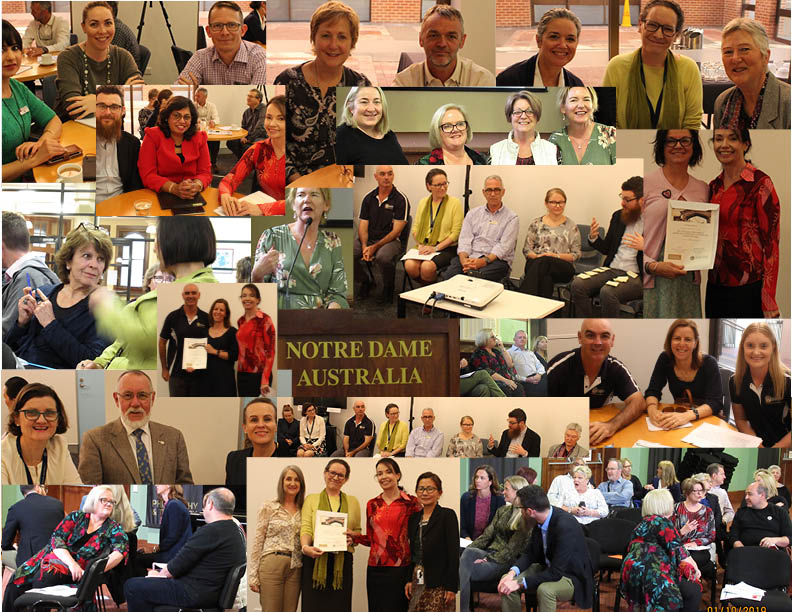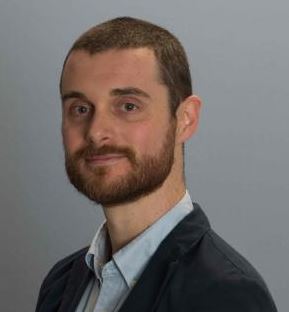
Keynote Speaker
It is not an exaggeration to state that Associate Professor Phillip (Phill) Dawson is a significant world leader in academic integrity and that, through this work, he is also renowned for his contribution to improving assessment and feedback in higher education. That is, an important strategy in supporting students to work with integrity is through evidence-based approaches to assessment. We were very lucky therefore to welcome Phill as our Keynote Speaker in 2019. He also generously gave of his time volunteering to conduct a hands-on assessment workshop later that afternoon: “Designing Assessment with the Assessment Design Decisions Framework”.
Phill’s Keynote showed us that assessment practices continue to evolve and that we are in the early stages of understanding that feedback can only happen when students respond to the information provided to them. When students don’t respond, it is simply “information transfer”. To embed feedback literacy into our everyday practices not only do we as academics need to improve how we deliver feedback, but we also need to help students improve their understanding and practice of feedback/feedforward. This includes providing them with the opportunity to hear feedback from multiple sources such as their peers and themselves. The end goal is that students are able to determine their performance against the criteria and standards for themselves i.e. “evaluative judgement”. The list of videos has been crafted as short “chunks” of the important ideas covered by Phill in his keynote.
- Feedback literacy (5:59)
- Students dealing with feedback (7:25)
- How academics deal with feedback (7:55)
- Learning to deal with feedback (3:33)
- Improving feedback literacy (5:25)
- Modelling to improve feedback literacy (9:01)
- Designing feedback (5:04)
Presentations
It was clear from the abstracts submitted that we are increasingly developing a community of Educator Scholars who have an interest in the Scholarship of Learning and Teaching in Higher Education. To assist academics along the continuum from sharing good learning and teaching practice ideas to researching whether their ideas make a difference to student outcomes, this year the LTO introduced a new category of presentations: “Research in Progress”. Find the full conference program booklet including presentation abstracts.
See Dr Jenny Pizzica, Academic Developer with the LTO, and her introduction to the scholarship of learning and teaching, setting the scene for the presentations to follow. Videos of the Sydney presentations are only seven minutes long. Unfortunately, due to technical difficulties the Fremantle presentations are not available as videos, however, each presenter has generously provided their PowerPoint slides.
Videos of the Sydney presentations are only seven minutes long. Unfortunately, due to technical difficulties the Fremantle presentations are not available as videos, however, each presenter has generously provided their PowerPoint slides.
-
Sydney presentations
SoTL Presentations
- Katrina Eddles-Hirsch & Lauren Stephenson - An exploratory study of differentiated instruction and the professional development of pre-service teachers
- Philip Dennett - Integrated assessment in a self-directed learning environment
- Kate Hartup, Adelle Colbourn, Thuan Thai & Amanda Yeung - An online approach to track and evaluate teacher education students’ numeracy capability
- Shannon Kennedy-Clark, Jessica Weight, Kiatin Williamson & Taylor Martyn - Voices on data literacy and initial teacher education: Pre-service teachers’ reflections and recommendations
- Lynn Thompson, Sally Robertson, Anna Williams & Ekavi Georgousopoulou - Embedding academic literacies into the ifrst year nursing program: the APSWa program
Research in Progress
- Deborah Pike - Immersive transdisciplinary experiences - Tertiary learning through playful activity and collaboration
- Kate Winchester & Julie Maakrun - “Seeking Asylum, Seeking Reflection”. Student self assessment and building a community of reflection in tertiary learning environments
-
Fremantle presentations
SoTL Presentations
- Annette Watkins - Wellness, transition and future of work - A program for first year Business students preparing for work and career
- Tahlia McCracken, Sian Chapman & Ben Piggott - Inclusive practice: Understanding the sentiments, attitudes and concerns of Health and Physical Education students
- Heidi Waldron - Finding time for flipped classroom: A luxury or essential for learning?
- Derek Hurrell & Lorraine Day - The importance of developing multiplicative thinking
- Sandra Wooltorton, Anna Dwyer, Judith Wilks & John Guenther – Promoting Aboriginal student engagement and success in Tertiary Education: Remote Areas
Research in Progress
- Inna Geoghegan, Alison Casey & Helen Rogers - Sessional academics’ experience of working at Notre Dame
- Clare Rossiter - Teaching with Articulate 360 (presented live in BlackBoard)
Wanting more information on Assessment?
ESC 2019 Assessment Resources takes you to a short list of resources about assessment available from our Libraries. There is a short description of what is covered in the resource and therefore why it might be useful.
Participation
You can also take a quick look at our photo montage that shows that we are one national learning community. Hopefully you’ll see new faces, as we welcomed many people to their first Educator Scholar Conference.

We think the following anonymous quote from a respondent about the conference sums up the value of a national approach. The main thing that I’m determined to do about my teaching is “to keep on talking to colleagues in other faculties as I tend to focus on my on School – there is so many great projects going on around the campus.”
Our evaluation survey indicated that most participants were senior academics in permanent roles. We hope that in 2020 we will be welcoming more new staff, especially early career, and sessional academics as presenters and/or active members of the audience. We think that this is very possible, given that the overwhelming majority of respondents reported that they would recommend the conference to a colleague.
Awards
The conference was an opportunity for our academics and students to demonstrate and be recognised for their innovative practices. We congratulate the following award recipients:
Awards for best abstracts:
- Philip Dennett – School of Arts & Sciences
- Lynn Thompson, Sally Robertson, Anna Williams & Ekavi Georgousopoulou – School of Nursing
- Tahlia McCracken, Sian Chapman & Ben Piggott – School of Health Sciences
- Heidi Waldron, Ainslie Robinson & Elina Tor – School of Medicine
Awards for best presentations:
- Kate Hartup, Thuan Thai, Adelle Colbourn & Amanda Yeung – School of Education
- Tahlia McCracken, Sian Chapman & Ben Piggott – School of Health Sciences
Prize for best paper:
- Lorna Davin, School of Medicine Fremantle, Jill Thistlethwaite, University of Technology Sydney & Emma Bartle, University of Queensland


Connect with Notre Dame on Social Media
Australia
Fremantle
Broome
Sydney